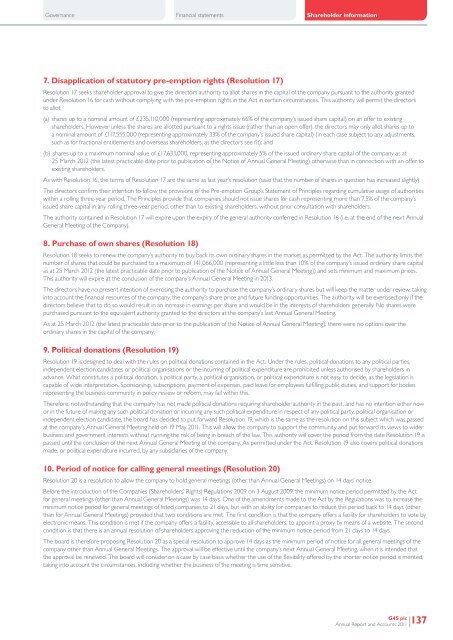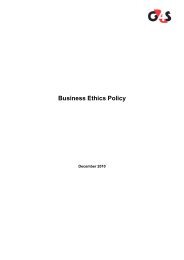G4S Annual Report and Accounts 2011
G4S Annual Report and Accounts 2011
G4S Annual Report and Accounts 2011
Create successful ePaper yourself
Turn your PDF publications into a flip-book with our unique Google optimized e-Paper software.
Governance Financial statements Shareholder information<br />
7. Disapplication of statutory pre-emption rights (Resolution 17)<br />
Resolution 17 seeks shareholder approval to give the directors authority to allot shares in the capital of the company pursuant to the authority granted<br />
under Resolution 16 for cash without complying with the pre-emption rights in the Act in certain circumstances. This authority will permit the directors<br />
to allot:<br />
(a) shares up to a nominal amount of £235,110,000 (representing approximately 66% of the company’s issued share capital) on an offer to existing<br />
shareholders. However unless the shares are allotted pursuant to a rights issue (rather than an open offer), the directors may only allot shares up to<br />
a nominal amount of £117,555,000 (representing approximately 33% of the company’s issued share capital) (in each case subject to any adjustments,<br />
such as for fractional entitlements <strong>and</strong> overseas shareholders, as the directors see fit); <strong>and</strong><br />
(b) shares up to a maximum nominal value of £17,633,000, representing approximately 5% of the issued ordinary share capital of the company as at<br />
25 March 2012 (the latest practicable date prior to publication of the Notice of <strong>Annual</strong> General Meeting) otherwise than in connection with an offer to<br />
existing shareholders.<br />
As with Resolution 16, the terms of Resolution 17 are the same as last year’s resolution (save that the number of shares in question has increased slightly).<br />
The directors confirm their intention to follow the provisions of the Pre-emption Group’s Statement of Principles regarding cumulative usage of authorities<br />
within a rolling three-year period. The Principles provide that companies should not issue shares for cash representing more than 7.5% of the company’s<br />
issued share capital in any rolling three-year period, other than to existing shareholders, without prior consultation with shareholders.<br />
The authority contained in Resolution 17 will expire upon the expiry of the general authority conferred in Resolution 16 (i.e. at the end of the next <strong>Annual</strong><br />
General Meeting of the Company).<br />
8. Purchase of own shares (Resolution 18)<br />
Resolution 18 seeks to renew the company’s authority to buy back its own ordinary shares in the market as permitted by the Act. The authority limits the<br />
number of shares that could be purchased to a maximum of 141,066,000 (representing a little less than 10% of the company’s issued ordinary share capital<br />
as at 25 March 2012 (the latest practicable date prior to publication of the Notice of <strong>Annual</strong> General Meeting)) <strong>and</strong> sets minimum <strong>and</strong> maximum prices.<br />
This authority will expire at the conclusion of the company’s <strong>Annual</strong> General Meeting in 2013.<br />
The directors have no present intention of exercising the authority to purchase the company’s ordinary shares but will keep the matter under review, taking<br />
into account the financial resources of the company, the company’s share price <strong>and</strong> future funding opportunities. The authority will be exercised only if the<br />
directors believe that to do so would result in an increase in earnings per share <strong>and</strong> would be in the interests of shareholders generally. No shares were<br />
purchased pursuant to the equivalent authority granted to the directors at the company’s last <strong>Annual</strong> General Meeting.<br />
As at 25 March 2012 (the latest practicable date prior to the publication of the Notice of <strong>Annual</strong> General Meeting), there were no options over the<br />
ordinary shares in the capital of the company.<br />
9. Political donations (Resolution 19)<br />
Resolution 19 is designed to deal with the rules on political donations contained in the Act. Under the rules, political donations to any political parties,<br />
independent election c<strong>and</strong>idates or political organisations or the incurring of political expenditure are prohibited unless authorised by shareholders in<br />
advance. What constitutes a political donation, a political party, a political organisation, or political expenditure is not easy to decide, as the legislation is<br />
capable of wide interpretation. Sponsorship, subscriptions, payment of expenses, paid leave for employees fulfilling public duties, <strong>and</strong> support for bodies<br />
representing the business community in policy review or reform, may fall within this.<br />
Therefore, notwithst<strong>and</strong>ing that the company has not made political donations requiring shareholder authority in the past, <strong>and</strong> has no intention either now<br />
or in the future of making any such political donation or incurring any such political expenditure in respect of any political party, political organisation or<br />
independent election c<strong>and</strong>idate, the board has decided to put forward Resolution 19, which is the same as the resolution on this subject which was passed<br />
at the company’s <strong>Annual</strong> General Meeting held on 19 May <strong>2011</strong>. This will allow the company to support the community <strong>and</strong> put forward its views to wider<br />
business <strong>and</strong> government interests without running the risk of being in breach of the law. This authority will cover the period from the date Resolution 19 is<br />
passed until the conclusion of the next <strong>Annual</strong> General Meeting of the company. As permitted under the Act, Resolution 19 also covers political donations<br />
made, or political expenditure incurred, by any subsidiaries of the company.<br />
10. Period of notice for calling general meetings (Resolution 20)<br />
Resolution 20 is a resolution to allow the company to hold general meetings (other than <strong>Annual</strong> General Meetings) on 14 days’ notice.<br />
Before the introduction of the Companies (Shareholders’ Rights) Regulations 2009 on 3 August 2009, the minimum notice period permitted by the Act<br />
for general meetings (other than <strong>Annual</strong> General Meetings) was 14 days. One of the amendments made to the Act by the Regulations was to increase the<br />
minimum notice period for general meetings of listed companies to 21 days, but with an ability for companies to reduce this period back to 14 days (other<br />
than for <strong>Annual</strong> General Meetings) provided that two conditions are met. The first condition is that the company offers a facility for shareholders to vote by<br />
electronic means. This condition is met if the company offers a facility, accessible to all shareholders, to appoint a proxy by means of a website. The second<br />
condition is that there is an annual resolution of shareholders approving the reduction of the minimum notice period from 21 days to 14 days.<br />
The board is therefore proposing Resolution 20 as a special resolution to approve 14 days as the minimum period of notice for all general meetings of the<br />
company other than <strong>Annual</strong> General Meetings. The approval will be effective until the company’s next <strong>Annual</strong> General Meeting, when it is intended that<br />
the approval be renewed. The board will consider on a case by case basis whether the use of the flexibility offered by the shorter notice period is merited,<br />
taking into account the circumstances, including whether the business of the meeting is time sensitive.<br />
<strong>G4S</strong> plc<br />
<strong>Annual</strong> <strong>Report</strong> <strong>and</strong> <strong>Accounts</strong> <strong>2011</strong><br />
137











